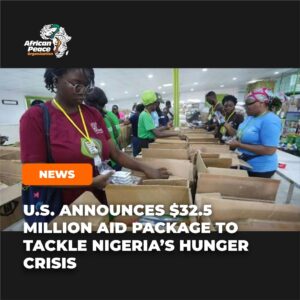U.S. Announces $32.5 Million Aid Package to Tackle Nigeria’s Hunger Crisis
Funding to reach over 764,000 in conflict-affected north; pregnant mothers, young children receive priority amid closure of clinics and rising malnutrition.
The United States has approved $32.5 million in humanitarian aid to help Nigeria respond to a worsening hunger crisis, particularly in areas hit by conflict and displacement.
The U.S. Agency for International Development (USAID) said the funding will provide food assistance, nutrition support for pregnant women and children, and resources for communities facing extreme food insecurity.
“Nigeria is facing one of its most severe hunger emergencies in recent years,” USAID Administrator Samantha Power said in a statement. “This support will save lives and help communities recover.”
The funding will provide food relief and nutritional support to internally displaced persons (IDPs) in the northeast and northwest of Nigeria.
In total, 764,205 people will benefit. Special attention is being paid to vulnerable groups: more than 41,500 pregnant and breastfeeding women and 43,235 children will receive targeted nutritional top-ups or electronic food vouchers.
Nigeria has struggled with food shortages driven by insurgency in the northeast, farmer-herder clashes in the Middle Belt, and soaring inflation. Aid agencies warn that millions remain at risk if urgent interventions are not scaled up.
According to the World Food Programme (WFP), northern Nigeria is in the grip of an “unprecedented hunger crisis,” with over 1.3 million people at risk of going without food assistance and up to 150 nutrition clinics in Borno State facing closure.
Conflict in the northeast has displaced more than 2 million people, while rising insecurity in the northwest and north-central regions (including clashes between farmers and herders) is adding to the humanitarian burden.
The WFP estimates that about 30.6 million people in Nigeria are now facing acute food insecurity due to a mix of conflict, inflation, climate shocks, and humanitarian funding shortfalls.
Source: AP News





